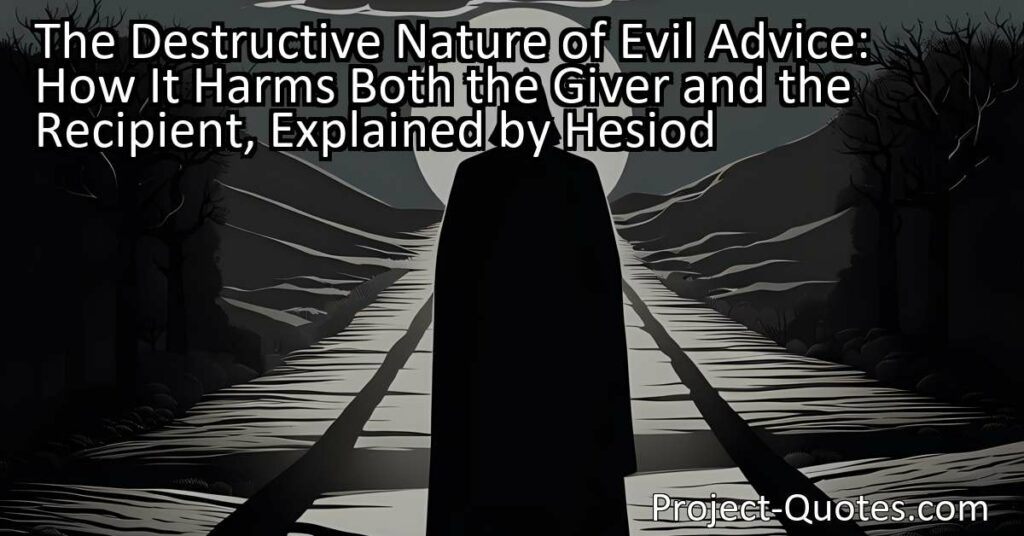The man who does evil to another does evil to himself, and the evil counsel is most evil for him who counsels it.
Hesiod
The Destructive Nature of Evil Advice: How It Harms Both the Giver and the Recipient, Explained by HesiodHesiod’s quote emphasizes the harmful effects of evil advice and how it negatively impacts both the giver and the recipient. This profound message teaches us the importance of choosing kindness and empathy, as engaging in acts of cruelty and malice only leads to negative consequences and perpetuates a cycle of harm. By embracing goodness and benevolence, we not only uplift others but also nurture our own well-being and contribute to a more harmonious world.
Table of Contents
Meaning of Quote – The man who does evil to another does evil to himself, and the evil counsel is most evil for him who counsels it.
In the words of the ancient Greek poet Hesiod, “The man who does evil to another does evil to himself, and the evil counsel is most evil for him who counsels it.” This profound quote holds a significant amount of wisdom and truth, shedding light on the consequences of our actions and the impact they have on our own well-being.
As human beings, we are often faced with choices that can either uplift or harm those around us. Hesiod reminds us that when we choose to engage in acts of evil towards others, we ultimately inflict harm upon ourselves. This concept can be understood through various lenses, including the moral, psychological, and spiritual aspects of our lives.
From a moral standpoint, the quote suggests that our actions have both immediate and long-lasting repercussions. Engaging in evil deeds, such as lying, cheating, stealing, or hurting others physically or emotionally, may seem advantageous in the short term, but it ultimately leads to negative outcomes for both parties involved. By harming someone else, we tarnish our own moral compass and diminish our own sense of integrity.
Additionally, the quote delves deeper into the psychological consequences of choosing to do evil. By engaging in harmful behaviors, we reinforce negative patterns of thinking and behaving within ourselves. This perpetuates a cycle of negativity that impacts our relationships, self-esteem, and overall well-being. When we treat others with kindness, respect, and empathy, we nurture positive emotions within ourselves, fostering healthier mental states and strengthening our own character.
Moreover, the quote touches upon the spiritual implications of our actions. Many religions and philosophical traditions emphasize the interconnectedness of all beings and the importance of treating others with compassion and fairness. When we act with malice towards others, we disregard these fundamental principles and distance ourselves from a sense of greater purpose and meaning. Conversely, when we choose to act in alignment with these values, we experience a sense of connectedness to the world around us and nurture a deeper sense of spirituality.
It is important to note that the quote also highlights the destructive nature of evil counsel. When someone advises and encourages others to engage in malevolent acts, both the counsellor and the recipient of the counsel are negatively impacted. The person offering the evil advice may possesses ulterior motives, such as power, jealousy, or a desire for revenge, leading them down a path of destruction. In turn, those who heed this counsel are also led astray, participating in actions that harm both themselves and others, thereby perpetuating the cycle of evil.
In a world filled with conflicts, violence, and cruelty, Hesiod’s words serve as a poignant reminder of the importance of choosing kindness, empathy, and love in our daily lives. By treating others with respect and compassion, we not only uplift those around us but also nourish our own souls. These acts of goodness and benevolence can have far-reaching effects, creating a ripple effect of positivity that extends beyond our immediate interactions.
It is essential for young readers, like those in seventh grade, to understand the significance of this quote. By internalizing the message that wrongdoing harms both the perpetrator and the victim, they can cultivate a strong sense of empathy and morality. This wisdom can guide their actions and decisions as they navigate the complexities of adolescence and mature into responsible, compassionate individuals.
In conclusion, Hesiod’s quote explores the profound truth that doing evil to another ultimately harms oneself. Whether viewed through moral, psychological, or spiritual lenses, it becomes clear that acts of cruelty, dishonesty, and malice lead to negative consequences for both the initiator and the recipient. By choosing to engage in kindness, empathy, and love, we foster personal growth, enhance our well-being, and contribute to a more harmonious world. Let us heed Hesiod’s wisdom and strive to be agents of good, understanding that in doing so, we are not only benefiting others but also nurturing our own souls.
I hope this quote inspired image brings you hope and peace. Share it with someone who needs it today!


